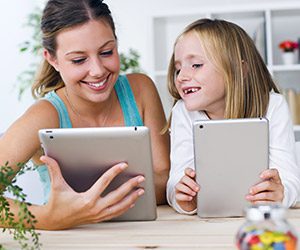In the education field, it’s a widely held notion that learning mathematics early in childhood is essential to ensure children’s school readiness. However, research suggests that children from economically disadvantaged communities often do not have the same opportunities to develop key foundational mathematics skills as their better-resourced peers. This has led to the development of preschool mathematics curriculum programs, which have been shown to have a positive impact on young children’s early mathematics learning. Because young children spend much of their time learning at home with their families, supporting children’s learning of early mathematics at home is another important strategy for ensuring school readiness.

Given the importance of promoting opportunities for young children in low-income households to learn at home, the Corporation for Public Broadcasting (CPB)-Public Broadcasting System (PBS) created the Ready to Learn (RTL) initiative, supported by the U.S. Department of Education. RTL delivers engaging, high-quality educational programming and resources through technology platforms, such as TV, computers, tablets and smartphones, to create experiences that enhance young children’s learning.
To evaluate how these media experiences could benefit early mathematics learning, researchers at SRI Education and Education Development Center (EDC) conducted a series of studies to measure the impact of these mathematics resources on children’s school readiness. The challenge we encountered in one of these studies involved assessing the specific set of mathematics skills targeted in the PBS KIDS PEG+CAT Intervention. Existing assessments included a larger set of mathematics skills and did not include subtests that aligned to the target skills and therefore would not be sensitive enough to detect learning in these areas.
To assess the promise of the PBS KIDS PEG+CAT Intervention, our research team developed an assessment that was aligned to the early mathematics skills targeted in the program, but that did not incorporate any activities or tasks from the media resources themselves. To do so, we first developed a concept map or blueprint, delineating specific learning goals. This concept map was then used to guide the development of assessment items. The items were designed to be developmentally appropriate and included formats used and tested in existing and validated early childhood mathematics assessments. The assessment included a flipbook with images for the children to see and detailed instructions for assessors. It also included physical manipulatives familiar to preschoolers. A draft of the assessment was pilot-tested with preschool children and revised based on user and expert feedback. By employing an evidence-centered design approach to develop a standardized assessment for early mathematics, we ensured proper measurement of skills, while avoiding bias due to over-alignment between activities in the program and activities in the assessment.
Analyses of assessment data in this study indicate that the PBS KIDS PEG+CAT Intervention had a significant positive influence on some of the target early mathematics skills. Our findings from the study also indicated that the assessment developed was sensitive enough to detect effects of a home intervention over a short period of time.
At the upcoming AERA conference, we will be sharing our documentation of this assessment development process. By sharing this information, we hope to support other efforts that may need to develop assessment methodology, given current limitations of available early childhood assessments. In addition, the assessment developed as a part of this study is one that can be used by others who wish to assess the same early mathematics skills. Ultimately, we believe that findings from this study can help build the evidence base and extend our understanding of how parents and children can engage with media and digital resources to promote early learning and ensure all children are ready for school.


